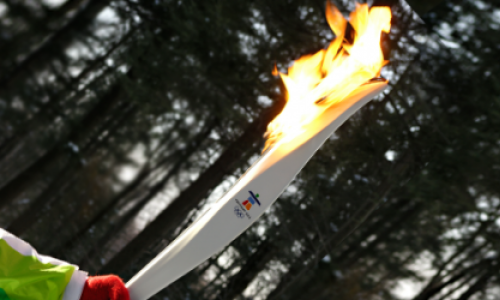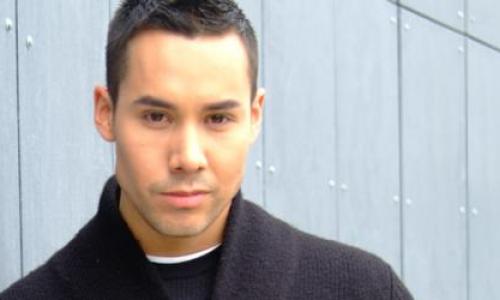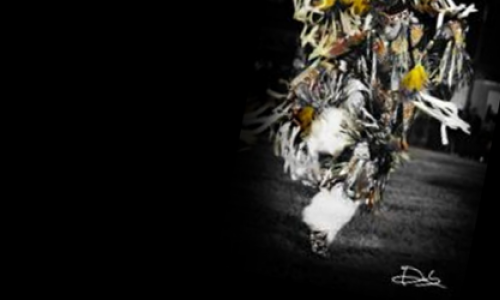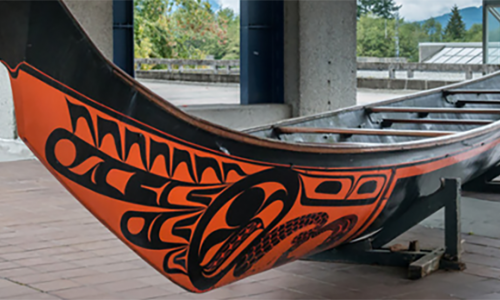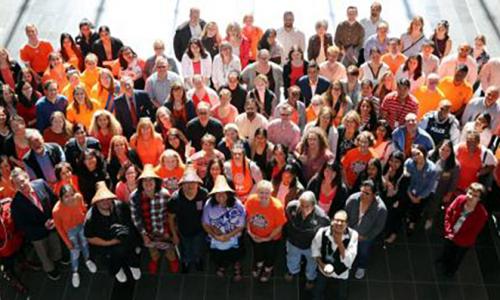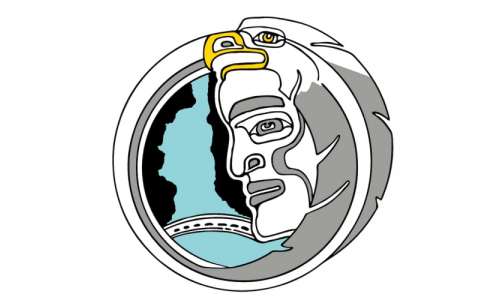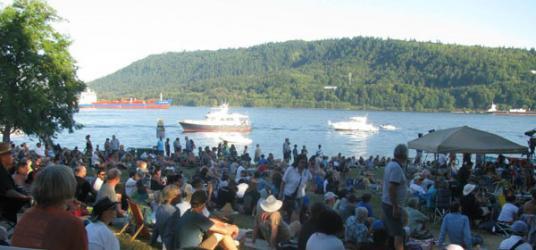
Christina Coolidge is an Indigenous Program researcher with Career Services at SFU. In this four-part series she discusses the creation of the Sacred Trust Initiative (STI), with the purpose of stopping the Kinder Morgan pipeline expansion. This is the second post of the Tsleil-Waututh Nation and the Sacred Trust Initiative Series.
The Tsleil-Waututh Nation's Sacred Trust Initiatives allies each have the same goal in mind, stopping the Kinder Morgan expansion, however, their experiences, understandings and perspectives brought them to this conclusion by very different means than that of the Tsleil-Waututh people.
For example, several of the members of BROKE (Burnaby Residence Opposing Kinder Morgan Expansion), who participated in interviews for this case study, were non-native so their experiences are not prompted by historical struggles for Indigenous sovereignty and equality from a collective standpoint. The members discussed Burnaby residents’ experiences with the 2007 spill and how that propels their momentum in opposing Kinder Morgan’s expansion. Their epistemological framework is different than the Tsleil-Waututh but their desired outcome remains the same.
Members of Burnaby Residence Opposing Kinder Morgan Expansion (BROKE), Ruth Walmsley and Elan Ross Gibson expressed their concerns associated with the expansion based on their experiences with the 2007 spill. Ms. Gibson said,
“We stand to, not all citizens, I guess. But we stand to lose a lot. Their tank farm, which is halfway up Burnaby mountain and we’re an earthquake zone. One thing that really concerns me is the fact that there is that high pressure gas plant below it as well, on the mountain. And if there was an earthquake and those things combine, I just think its terrifying. We’re trying to notify and educate the citizens of just how many pipelines are running underneath our properties, underneath the…everything in Burnaby. In the 2007 oil spill, most people did not know the pipeline was under their property. Now we have signs all through Burnaby. Great yellow markers, I mean you can’t go down a street without seeing these markers telling you where a pipeline is. And that’s through most of Burnaby, particularly North Burnaby. “
When asked how they were effected by the 2007 spill:
Elan Ross Gibson:
“Well, I think the spill effected…that’s where BROKE actually originated with some of the residents that were effected. Like Mary Hatch was one of the founders of BROKE. Her home was just covered in oil. She speaks about being very lucky that she didn’t have her windows open at the time so it didn’t go in her house but a lot of her neighbours had to have, this was in West Ridge, sorry, it was just before the terminal in the Burrard Inlet. I think there are about 200 residences in that area. And they had to be away from their homes for at least five days some of them longer. The renovations and everything are still ongoing to reclaim the land and their homes and just everything about it. And that’s what brought it to mind, the fact that it did impact us. Things we had no knowledge of before.”
Ruth Walmsley:
“Yeah, yeah. And I guess one of the biggest concerns for me is if the pipeline is approved its going to result in a big expansion of the tar sands and you know, what we really need desperately to be doing right now is transitioning off of fossil fuels and if these pipelines are allowed to be built its going to cause a huge ramping up of fossil fuels. And I just think that thats extremely short sighted and we just can’t allow that to happen.”
What is evident from these concerns expressed by BROKE members, is their distress regarding the health and well-being of the people and the lands. This coincides with the Sacred Trust’s concerns as well. BROKE’s process in opposing the expansion has been slightly different than the Sacred Trust’s, however the events organized by BROKE support the Sacred Trust’s and vice versa. The communication between the two parties and their desire to work toward a common goal, that being to stop the expansion, is what unites them, but it is their differences in background and experience that gives them power. It is their differences that determine the credibility of their concerns because they cross cultures.
Some of the activities organized by BROKE were explained by Ruth Walmsley and Elan Ross Gibson.
Ruth Walmsley:
“And we have done, over the last two years, a number of town halls where we’ve brought people in the community together to hear speakers like Robin Allan and politicians who, in our community, are also working with us to oppose Kinder Morgan pipeline. We’ve had film screenings to bring the community in and educate them, or raise awareness about the issue of oil pipelines and tar sands. And we, this past April organized a major event, which was a people’s procession and rally against the pipeline where we worked with an artist and we had a six kilometre procession through Burnaby, which actually mapped the route of the existing and proposed Kinder Morgan pipeline and it culminated in a rally, where we had quite a few different speakers. And we feel quite happy with the way that that worked out.”
Elan Ross Gibson:
“We had a lot of cooperation. We realized that we are on unceded Tsleil-Wuatuth land and so we’ve had Carleen Thomas speak to us as well as coming to the rally. We’ve had sponsorship at the rallies with a lot of organizations. I’m not going to attempt to name them because I’m sure I’ll forget somebody but, it was successful. It was peaceful, beautiful day. God conspired with us to make it a wonderful day.”
Ruth Walmsley:
“Right. And one of the other big things is that now that the National Energy Board process is getting going with the Kinder Morgan pipeline, BROKE applied to be an intervenor and was accepted to be an intervenor in the National Energy Board hearings. So a lot of our energy is going into preparing that and we’re in the middle of that right now.”
Forest Ethics’ Advocacy’s “focus is to ensure that destructive projects and weakened environmental laws are vigorously and successfully opposed.”Sven Biggs, a campaign organizer for Forest Ethics summarized their involvement quite eloquently.
Sven Biggs:
“My name is Sven Biggs and I work for an organization called Forest Ethics Advocacy as a campaign organizer and I’ve been working to raise awareness and stop the Kinder Morgan pipeline for about four years now. When we first started, a local activist came to us. He had noticed that there was more oil tankers coming through Burrard Inlet than was normal, and we started doing research and thats when we found out about this big American corporation called Kinder Morgan that had bought an existing pipeline that runs from Edmonton Alberta to West Ridge in Burnaby. At that point in time about 70 tankers a year were filling up in Burrard Inlet and going mostly down to California to bring tar sands crude to refineries there on the North American west coast. Since then Kinder Morgan has announced that they plan to build an entirely new pipeline that is about three times the size of the existing pipeline or about the same size as the Embridge pipeline across northern BC that would bring tar sands crude to the west coast and export it to Asia and other markets. So, we’ve been working with communities all on the pipeline route around the inlet to raise awareness about that ever since, including the Tsleil-Waututh. And we’ve been working very closely with the Sacred Trust Initiative for a long time now because their local knowledge of the inlet and the resources and technical abilities that they have, have really added to the campaign and they’ve been great allies to work with. We’re really proud to take leadership from them and be part of that community as they’ve opened up doors for us and so we’re very thankful to have an opportunity to work with them.”
Sven made an excellent point by acknowledging the Tsleil-Waututh people’s local knowledge of the land and waters and the resources they have collected throughout the years of negotiations. An example of resources that will strengthen their cause is the creation of the bioregional atlas in 2006. Tsleil-Waututh knowledge of the lands and waters of their territory combined with the right of Aboriginal title over unceded land strengthens any potential legal challenges that may arise between the Tsleil-Waututh and Kinder Morgan. For those with a similar cause and the same end-goal in mind, combining resources, knowledge, networks, etc., gives them power. Rather than David and Goliath, it becomes David and a large, white man with too much money. It will still have its challenges, but the Tsleil-Waututh and their allies together, have many advantages.
In the case of similar future challenges, these coalitions may persist. Activist groups like, BROKE, PIPEUP, Forest Ethics’ Advocacy, North Shore NOPE (No Pipeline Expansion), as well as many others, have many common environmental interests, and Aboriginal title has the potential to be the winning ticket in a legal confrontation, especially due to the most recent, unanimous ruling for the Tsilqhot’in Nation from the Supreme Court of Canada, which may very well shift the landscape of Aboriginal/Government relations in this country. It is in the best interest of both parties to create, maintain and continue to strengthen their relationships based on mutual values and priorities.
During the alliance meeting between the Sacred Trust and several members of various activist groups, as well as citizens, attendees brainstormed ways to bring people together through cross culture work. The majority of those in attendance were white, one was Latino and several were First Nations. Rueben George emphasized the importance of coming together and noted that a study had indicated that 71% of Burnaby residence supported the Tsleil-Waututh Nation in this fight.This is an important point as it indicates that the kinetics of the TWN has made a significant impact on public opinion. By engaging in face work, the STI has shifted, what could easily be misconstrued as ‘just another native protest’, to a valid and important public issue. More times than not, based on discursive news reporting and misunderstanding, the public is not on the side of First Nation’s communities, however this is not the case in regard to the STI.
Several suggestions were made at the alliance meeting to continue to build partnerships; hosting a formal alliance discussion event, feet-to-pavement outreach work, networking, material distribution and approaching union organizations. Mr. Oostindie said that Unifor, a Canadian trade union had been contacted already.
Upon speaking with Nathan Woods, the president of Local 111, the bus driver’s union in order to gain a better understanding of the ways in which unions contribute to such causes he said,
“Unifor is very socially hands on. They've involved themselves whenever asked in regional and national issues supporting rights protection as well as community growth and it wouldn't surprise me if we sponsored this event (Salish Seas Summer Gathering), as we do with other community issues and events (pride parade). I vice chair the BC regional council so our immediate audience is nearly 40,000 men and women so yeah...pipelines, human rights, and many other social interests we're there! We sponsor these events with money or some other forms of physical support, i.e. people to protest etc (pipeline).”
What this demonstrates is that there are a variety of ways in which the STI partners with other groups. It is also through collaboration with white collar workers, such as trade unions that they do face work in order to establish their relevance in mainstream society.










